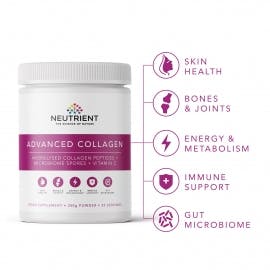The Best Protein Powder for Weight Management– A Complete Guide
Why Protein is Essential for Health and Vitality
Protein is an essential part of everyone’s diet. After water, it’s the most plentiful substance within the human body. Each of us has around 30-50,000 unique proteins, which are made up of building blocks known as amino acids.
Proteins perform a variety of functions in the body with each one having a unique and specific job. They can accelerate reactions in the body, transport oxygen and transmit messages between cells. Without protein, you wouldn’t have skin, muscles, hair, tendons or ligaments.

Although your body can manufacture some amino acids, the remaining must come from your diet. Those you cannot produce are known as ‘essential amino acids’. Experts suggest that you need around 10% to 35% of your daily calories from protein or at least 0.36 grams of protein per pound of ideal body weight daily.
Example: A 140 Ib sedentary person needs: 140 x 0.36 = 50.4 grams of protein per day
Estimating your protein intake can be tricky because foods often contain more than one macronutrient. For example, foods you consider primarily protein may also contain fat, while those seen as carbohydrates usually include some protein, along with salt, water, fibre, vitamins, and minerals.
Here are two examples:
- An average chicken breast portion without skin provides approximately 42g of protein and 2.9g of fat.
- 100g kidney beans contain 15g protein, 40g carbohydrates and 0.8g fat
Key Benefits of Protein Powders
Protein powders can offer several benefits, such as:
Weight management — Protein food sources take the longest to digest, leaving you feeling fuller for longer. This reduces cravings and helps you eat less overall, which lowers your overall calorie intake and helps to preserve lean muscle mass during weight loss. Research shows that a diet rich in high-quality protein powder may help reduce ghrelin (a hunger hormone) and increase peptide YY (a hormone that signals satiety), helping curb appetite and support portion control. 1
Promotes healthy blood sugar levels – Protein helps to reduce blood sugar dips throughout the day. This increases your body’s sensitivity to insulin, a hormone involved in blood sugar control. Maintaining a stable blood sugar balance can prevent sugar cravings, irritability, fatigue and mood swings.
Muscle growth and repair - Protein is essential for building and repairing muscles. This is especially important after you exercise when your muscles need to recover and grow stronger. Muscles also accelerate the body’s calorie-burning capacity. 2
Immune support – Protein provides the building blocks to create immune cells and antibodies that protect your body from illness. Without enough protein, your immune system may weaken, making it harder to fight off infections.
Improves Sleep – Tryptophan, an essential amino acid, is vital for neurotransmitter function. It serves as a precursor to serotonin, later converted into melatonin—the hormone that regulates the sleep-wake cycle. According to research, a tryptophan deficiency may lower serotonin levels, potentially causing sleep disturbances. 3
Convenience - When faced with a busy schedule and limited time to cook or plan meals, protein powders offer a quick and easy way to boost your protein intake.
.png)
Animal-Based Protein Powders
Compared to plant-based proteins, animal-based proteins are generally easier to digest and more effective at boosting muscle protein synthesis and supporting muscle mass. Here are four of the most commonly used supplements:
1. Collagen powder - Collagen is the most abundant protein in your body. Collagen fibres are used to create the strong frameworks that underpin the foundations of your skin, bones, cartilage, organs, muscles, tendons, ligaments, blood vessels, teeth, hair and nails. To maintain these important tissues it’s a good idea to ensure that about one-third of your protein intake comes from collagen sources or supplements.
2. Bone broth protein powder - Bone broth protein powder is made by simmering animal bones and tissues to get all the nutrients out, then drying the liquid into a powder. It also contains various minerals.
3. Whey protein powder - Whey protein, derived from milk is quickly absorbed however, recent research highlights potential long-term risks. A 2024 scientific review found that prolonged high-dose whey use, particularly in inactive individuals, may increase the risk of liver and kidney damage. Other concerns include acne, changes in gut flora and reduced bone mass. 4
4. Casein protein powder - Casein is another protein that comes from milk. Unlike whey, your body digests casein slowly. This means it releases amino acids into your blood over a longer time. People with known milk allergies should avoid casein protein.
Plant-Based Protein Powders
Vegans and vegetarians who prefer to avoid animal derived products can still gain protein support from plant-based protein powders. Some offer a more complete amino acid profile than others. The following are among the most commonly used varieties:
1. Soy Protein – is derived from soybeans and is considered a complete protein (containing all 8 amino acids). However, soy protein powder is not suitable for those with soy allergies or sensitivities. Also because it contains phytoestrogens, there are concerns that in certain individuals it may affect hormone balance.
2. Pea Protein – is extracted from yellow and green split peas and has a slightly gritty texture. It is easily digested but has an incomplete amino acid profile.
3. Hemp Protein – is derived from hemp seeds with a slightly earthy flavour. It is a rich source of omega 3s and fibre and has a complete amino acid profile. However, it has a lower protein content than other protein powders.
4. Rice Protein – is typically made from brown rice and is easily digestible. However, it is low in lysine and has a chalky texture and distinct flavour.
5. Pumpkin Seed Protein – is derived by grinding pumpkin seeds and removing the oil content. It has a mild nutty taste and is easily digested but is often more expensive than others. It is rich in fibre, magnesium, zinc and iron as well as vitamin E and carotenoids. However, it is low in lysine and has slightly less protein per
serving compared to other protein powders like pea or soy.
.png)
Understanding Different Forms of Protein Powder
Protein powders come in various forms—concentrates, isolates, and hydrolysates—each with distinct characteristics:
Hydrolysates - These proteins have been pre-digested, making them easier and faster for your body to absorb. Ideal for the elderly or people with digestion issues.
Isolates - These are more refined, containing over 90% protein. They have less fat and lactose, which might make them a better choice for people who can’t tolerate lactose.
Concentrates - These are about 80% protein by weight, with the rest being fats, carbs, and other nutrients.
Fuel your body with the right protein, and you'll feel stronger, healthier, and ready to take on each day with confidence and vitality.
Editor: Alejandra Toro, Pshychologist, MSc Nutrition and Behaviour
REFERENCES
1.Heather J. Leidy Cheryl L.H. Armstrong Minghua Tang Richard D. Mattes Wayne W. Campbell. The
Influence of Higher Protein Intake and Greater Eating Frequency on Appetite Control in Overweight and
Obese Men. Obesity 2012; 18,9: 1725-1732. https://doi.org/10.1038/oby.2010.45.
2.Krzysztofik M, Wilk M, Wojdała G, Gołaś A. Maximizing Muscle Hypertrophy: A Systematic Review of
Advanced Resistance Training Techniques and Methods. International Journal of Environmental Research
and Public Health. 2019; 16(24):4897. https://doi.org/10.3390/ijerph16244897.
3.Carbohydrates and sleep latency. https://www.ncbi.nlm.nih.gov/pmc/articles/PMC5612383/.
4.Vasconcelos QDJS, Bachur TPR, Aragão GF. Whey protein supplementation and its potentially adverse
effects on health: a systematic review. Appl Physiol Nutr Metab. 2021 Jan;46(1):27-33. doi: 10.1139/apnm-
2020-0370. Epub 2020 Jul 23. PMID: 32702243.




